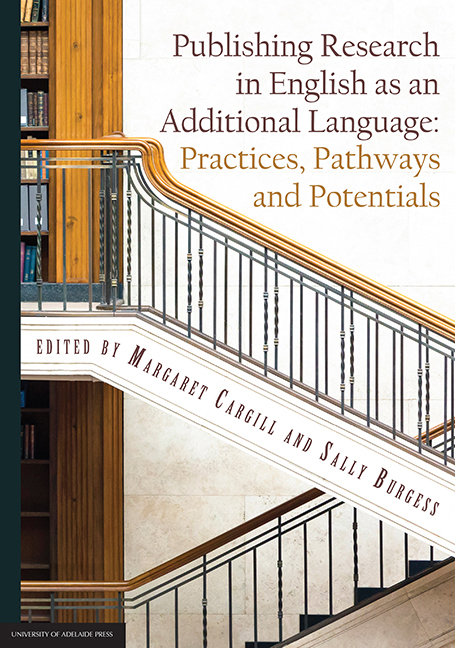Book contents
- Frontmatter
- Contents
- List of contributors
- Acknowledgements
- Foreword
- Introduction: Unpacking English for Research Publication Purposes [ERPP] and the intersecting roles of those who research, teach and edit it
- 1 Accept or contest: A life-history study of humanities scholars’ responses to research publication policies in Spain
- 2 Introducing research rigour in the social sciences: Transcultural strategies for teaching ERPP writing, research design, and resistance to epistemic erasure
- 3 Blurring the boundaries: Academic advising, authors’ editing and translation in a graduate degree program
- 4 The delicate art of commenting: Exploring different approaches to editing and their implications for the author-editor relationship
- 5 The CCC Model (Correspondence, Consistency, Correctness): How effective is it in enabling and assessing change in text-editing knowledge and skills in a blended-learning postgraduate course?
- 6 How credible are open access emerging journals? A situational analysis in the humanities
- 7 Disseminating research internationally: Intra-subdisciplinary rhetorical structure variation in immunity and allergy research articles
- 8 Scientists publishing research in English from Indonesia: Analysing outcomes of a training intervention to inform institutional action
- 9 ‘The one who is out of the ordinary shall win’: Research supervision towards publication in a Chinese hospital
- 10 The geopolitics of academic plagiarism
- 11 Training ‘clerks of the [global] empire’ for 21st-century Asia? English for Research Purposes (ERP) in Vietnam
- 12 Standardisation and its discontents
- Reflections and future directions in publishing research in English as an Additional Language: An afterword
Foreword
Published online by Cambridge University Press: 16 March 2018
- Frontmatter
- Contents
- List of contributors
- Acknowledgements
- Foreword
- Introduction: Unpacking English for Research Publication Purposes [ERPP] and the intersecting roles of those who research, teach and edit it
- 1 Accept or contest: A life-history study of humanities scholars’ responses to research publication policies in Spain
- 2 Introducing research rigour in the social sciences: Transcultural strategies for teaching ERPP writing, research design, and resistance to epistemic erasure
- 3 Blurring the boundaries: Academic advising, authors’ editing and translation in a graduate degree program
- 4 The delicate art of commenting: Exploring different approaches to editing and their implications for the author-editor relationship
- 5 The CCC Model (Correspondence, Consistency, Correctness): How effective is it in enabling and assessing change in text-editing knowledge and skills in a blended-learning postgraduate course?
- 6 How credible are open access emerging journals? A situational analysis in the humanities
- 7 Disseminating research internationally: Intra-subdisciplinary rhetorical structure variation in immunity and allergy research articles
- 8 Scientists publishing research in English from Indonesia: Analysing outcomes of a training intervention to inform institutional action
- 9 ‘The one who is out of the ordinary shall win’: Research supervision towards publication in a Chinese hospital
- 10 The geopolitics of academic plagiarism
- 11 Training ‘clerks of the [global] empire’ for 21st-century Asia? English for Research Purposes (ERP) in Vietnam
- 12 Standardisation and its discontents
- Reflections and future directions in publishing research in English as an Additional Language: An afterword
Summary
It has practically become a commonplace that,1in the past two decades, pressures for multilingual scholars to publish their work in English continue to intensify and to spread across global contexts. Even more recently, in many locations acceptable target journals have been identified as those included in high-status citation indexes — in other words, target journals have become sanctioned and explicitly linked to the evaluation of and rewards for scholars’ academic work (Curry & Lillis, 2014; Lillis & Curry, 2010). Pressures have also heightened for postdoctoral students to publish before finishing their degrees (Huang, 2010). The research field that investigates various aspects of academic writing for publication has burgeoned, from early studies deconstructing texts in order to analyse generic features (Swales, 1990) to research exploring a wide range of aspects, including the pressures on scholars living and working in specific contexts, their responses to pressures, their writing practices, and their perspectives on all of these aspects (Bennett, 2014; Hanauer & Englander, 2013; Lillis & Curry, 2010). A small but growing strand of research has also explored the impact of national and institutional policies about publishing (Feng, Beckett & Huang, 2013; Lee & Lee, 2013), and the changing nature of scholarly journals (including open access), the practices of journal editors and reviewers, and scholar-writers’ interactions with these powerful gatekeepers (Lillis, 2012; Lillis & Curry, 2015; Sheridan, 2015).
The unrelenting pressure to publish has generated two important trends in relation to supporting multilingual writers in publishing:
a growing demand for service from those who support research writers on an individual basis — often called ‘authors’ editors’
the development of a raft of pedagogical supports for multilingual writers (both scholars and graduate students).
These approaches range from writing and publishing guides (for example, Cargill & O'connor, 2013; Curry & Lillis, 2013; Swales & Feak, 2012), to individual consulting through writing centres, to dedicated workshops, to face-to-face and online modules or full-credit courses on writing for publication (Cargill & O'connor, 2006; see also Curry & Lillis, in press). The emergence of these interventionist/pedagogical approaches raises a number of issues, including important questions about the multiple and sometimes conflicting roles of those involved as ‘experts’ and instructors in such programs.
- Type
- Chapter
- Information
- Publishing Research in English as an Additional LanguagePractices, Pathways and Potentials, pp. xv - xviiiPublisher: The University of Adelaide PressPrint publication year: 2017

